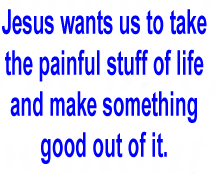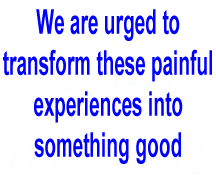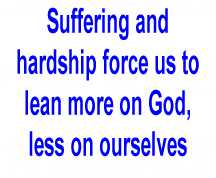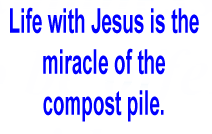I Love Garbage
continued from Page 1
 A horrific storm of hurricane force hit The Caribbean National Forest a couple of years ago. The forest was rare in the world for its beauty and the way it covered the island, sheltering everything. The forest was totally destroyed, leaving no tree standing. That place of rare beauty was finished. No one would ever again stroll or hike beneath the beautiful pines.
A horrific storm of hurricane force hit The Caribbean National Forest a couple of years ago. The forest was rare in the world for its beauty and the way it covered the island, sheltering everything. The forest was totally destroyed, leaving no tree standing. That place of rare beauty was finished. No one would ever again stroll or hike beneath the beautiful pines.
Several months after the storm hit, the resident Park Rangers quietly reported something they had been noticing. There were flowers coming up and blooming. Flowers had never been there in the previous centuries. The shade of the trees was too much to allow for such life on the ground. But there they were—beautiful blossoms they had never seen before.
 As I pondered this sad event I realized it was like a parable of life. That is, when the storms of life hit us, and they can be heartbreaking and devastating, we can in time—and even with tears in our eyes and with our hearts still breaking—notice flowers here and there. There are good things trickling out of the heartbreaks of life.
As I pondered this sad event I realized it was like a parable of life. That is, when the storms of life hit us, and they can be heartbreaking and devastating, we can in time—and even with tears in our eyes and with our hearts still breaking—notice flowers here and there. There are good things trickling out of the heartbreaks of life.
I think the bottom line of that reality—that so much good, so much improvement and growth can follow heartache, breakdowns, painful losses—is that the good Lord meets us there.
God does not send the heartaches and disasters, the breakage, and the disappointments. They are a part of life in a broken world. They are the outcomes of the mistakes, failures and wrongness the human race has for all of history slipped into and generated.
But healing happens, and new wonderful flowers regularly bloom after heartbreak. All are the evidence of a loving God who moves into our broken and painful places. That is where God is—renewing, restoring, healing, and helping when tragedy and heartbreak happens.
In the deep South, in Enterprise, Alabama, there is a monument to an insect. It is the boll weevil. At one point in history, the boll weevil destroyed the economy of the South by destroying the cotton crop. Every year the plantation owners would try again. They would plant the cotton seeds and hope for the best. But, inevitably, the boll weevil moved in and did its damage.
Yet, today, there is a monument to the boll weevil. Why a monument to the enemy? Because the boll weevil forced the South, totally dependent on cotton, to diversify, to find other ways of building their economy, to plant other crops, to start other businesses. Later, after the changes had become well-established throughout the south, the plantation owners were far better off than when everything depended on cotton. When they realized what had happened, they built a monument to that insidious bug, the boll-weevil. Hailing the beetle as a “herald of prosperity,” the 13-foot-tall landmark stands as the world’s only monument built to honor an agricultural pest. It is a tribute to how something disastrous can be a catalyst for change, and a reminder of how the people of Enterprise had adjusted in the face of adversity. Their enemy had stimulated profound growth and improvement in their economy.
 That’s how God wants us to live. Never minimizing the pain. Never belittling or denying the agony and difficult circumstances. Not allowing our tear ducts to dry up and our aching hearts to become calloused. But we are urged, with the Lord’s helping presence and love, to transform these painful experiences, of which life is full, into something good.
That’s how God wants us to live. Never minimizing the pain. Never belittling or denying the agony and difficult circumstances. Not allowing our tear ducts to dry up and our aching hearts to become calloused. But we are urged, with the Lord’s helping presence and love, to transform these painful experiences, of which life is full, into something good.
Recently I talked to an Iraqi War veteran who had been seriously injured and narrowly escaped death in Iraq. I asked him if he had any resentment, or if he felt cheated because there was so much anti-war sentiment in the U.S. He was quick to say, to my surprise, that he held no bitterness, whatsoever. His near fatal experience, the loneliness and pain that went with it, he said, were the most valuable and important chapters of his life. “It changed my life for the better,” he said.
Romans 5:35 speaks of a formula about how this happens. It says , “Suffering produces perseverance; perseverance produces character; and character produces hope. Hope does not disappoint us because God has poured out his love into our hearts.” Suffering is real. We should never deny that or belittle it. But profound pain, endured with Jesus’ loving promises, builds a capacity for endurance and perseverance. We gain vital life strengths when we suffer without giving up or turning permanently bitter. It is hard and difficult, but it makes us into deeper and wiser and stronger people. It builds character.
That is where we must see our loving God. God does not send these disappointments; He is present with us, holding us, weeping with us, encouraging us and instilling new ideas and outlooks which make us and the world a better place. It is as if he calls, “Come unto me all you who are hurting and weeping and grieving. I will weep with you, hold you, and together we will walk and soar again.” God is so good.
 The key word is H-O-P-E. Hope is a confidence that what is wanted will happen. It is an assurance that there will be a positive solution to a problem. Hope is the adrenalin of life. It triggers energy, motivates the spirit, causes the juices of the body to flow and heal and nourish. Hopeful people are alive and well. Hope is a positive attitude that gives zest to living. It is to know that our loving Lord will hold us, encourage us, heal us and lead us to deeper places and higher places. He is there to help the crushed get up again, get moving again, create solutions, answers and even beauty where there is emptiness, or wreckage.
The key word is H-O-P-E. Hope is a confidence that what is wanted will happen. It is an assurance that there will be a positive solution to a problem. Hope is the adrenalin of life. It triggers energy, motivates the spirit, causes the juices of the body to flow and heal and nourish. Hopeful people are alive and well. Hope is a positive attitude that gives zest to living. It is to know that our loving Lord will hold us, encourage us, heal us and lead us to deeper places and higher places. He is there to help the crushed get up again, get moving again, create solutions, answers and even beauty where there is emptiness, or wreckage.
 Most hopeful people have suffered. They are those who no longer rest their confidence in their own abilities alone. That’s what suffering and hardship can do to us. It forces us to lean more on God, less on ourselves. It motivates us to look to Jesus. When we rely on ourselves, we know deep in our hearts that what we are relying on isn’t very substantial.
Most hopeful people have suffered. They are those who no longer rest their confidence in their own abilities alone. That’s what suffering and hardship can do to us. It forces us to lean more on God, less on ourselves. It motivates us to look to Jesus. When we rely on ourselves, we know deep in our hearts that what we are relying on isn’t very substantial.
Life with Jesus is the miracle of the compost pile. The good Lord takes our garbage and turns it into rich, growth-producing soil.
May this be our outlook on life—that no matter what happens, the loving Lord is there with us and will help us, not only to recover but to become deep, wise, and happy again, and may in fact some day build monuments